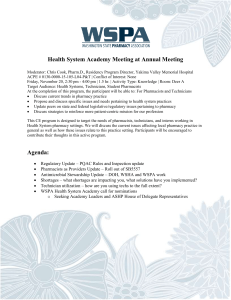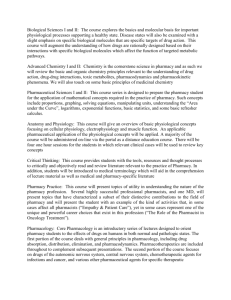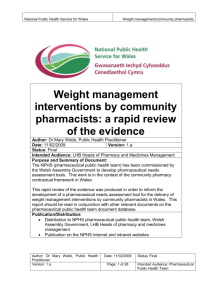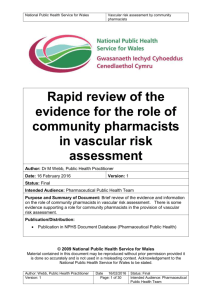Microsoft Word - Aston Research Explorer
advertisement
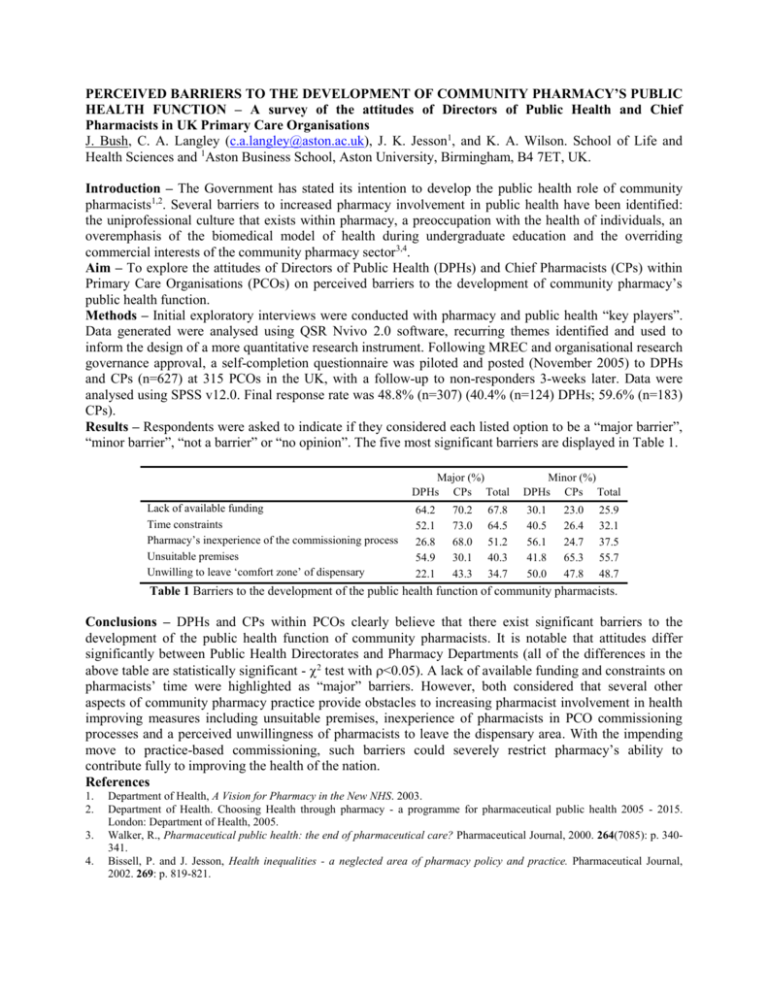
PERCEIVED BARRIERS TO THE DEVELOPMENT OF COMMUNITY PHARMACY’S PUBLIC HEALTH FUNCTION – A survey of the attitudes of Directors of Public Health and Chief Pharmacists in UK Primary Care Organisations J. Bush, C. A. Langley (c.a.langley@aston.ac.uk), J. K. Jesson1, and K. A. Wilson. School of Life and Health Sciences and 1Aston Business School, Aston University, Birmingham, B4 7ET, UK. Introduction – The Government has stated its intention to develop the public health role of community pharmacists1,2. Several barriers to increased pharmacy involvement in public health have been identified: the uniprofessional culture that exists within pharmacy, a preoccupation with the health of individuals, an overemphasis of the biomedical model of health during undergraduate education and the overriding commercial interests of the community pharmacy sector3,4. Aim – To explore the attitudes of Directors of Public Health (DPHs) and Chief Pharmacists (CPs) within Primary Care Organisations (PCOs) on perceived barriers to the development of community pharmacy’s public health function. Methods – Initial exploratory interviews were conducted with pharmacy and public health “key players”. Data generated were analysed using QSR Nvivo 2.0 software, recurring themes identified and used to inform the design of a more quantitative research instrument. Following MREC and organisational research governance approval, a self-completion questionnaire was piloted and posted (November 2005) to DPHs and CPs (n=627) at 315 PCOs in the UK, with a follow-up to non-responders 3-weeks later. Data were analysed using SPSS v12.0. Final response rate was 48.8% (n=307) (40.4% (n=124) DPHs; 59.6% (n=183) CPs). Results – Respondents were asked to indicate if they considered each listed option to be a “major barrier”, “minor barrier”, “not a barrier” or “no opinion”. The five most significant barriers are displayed in Table 1. Major (%) DPHs CPs Total Lack of available funding Time constraints Pharmacy’s inexperience of the commissioning process Unsuitable premises Unwilling to leave ‘comfort zone’ of dispensary 64.2 52.1 26.8 54.9 22.1 70.2 73.0 68.0 30.1 43.3 67.8 64.5 51.2 40.3 34.7 Minor (%) DPHs CPs Total 30.1 40.5 56.1 41.8 50.0 23.0 26.4 24.7 65.3 47.8 25.9 32.1 37.5 55.7 48.7 Table 1 Barriers to the development of the public health function of community pharmacists. Conclusions – DPHs and CPs within PCOs clearly believe that there exist significant barriers to the development of the public health function of community pharmacists. It is notable that attitudes differ significantly between Public Health Directorates and Pharmacy Departments (all of the differences in the above table are statistically significant - 2 test with <0.05). A lack of available funding and constraints on pharmacists’ time were highlighted as “major” barriers. However, both considered that several other aspects of community pharmacy practice provide obstacles to increasing pharmacist involvement in health improving measures including unsuitable premises, inexperience of pharmacists in PCO commissioning processes and a perceived unwillingness of pharmacists to leave the dispensary area. With the impending move to practice-based commissioning, such barriers could severely restrict pharmacy’s ability to contribute fully to improving the health of the nation. References 1. 2. 3. 4. Department of Health, A Vision for Pharmacy in the New NHS. 2003. Department of Health. Choosing Health through pharmacy - a programme for pharmaceutical public health 2005 - 2015. London: Department of Health, 2005. Walker, R., Pharmaceutical public health: the end of pharmaceutical care? Pharmaceutical Journal, 2000. 264(7085): p. 340341. Bissell, P. and J. Jesson, Health inequalities - a neglected area of pharmacy policy and practice. Pharmaceutical Journal, 2002. 269: p. 819-821. Focal Points The Government intends to develop the public health role of community pharmacists but progress towards this goal has, to date, been limited. Directors of Public Health and Chief Pharmacists in UK Primary Care Organisations were surveyed by self-completion postal questionnaire. Policy-makers within the NHS perceive several aspects of current pharmacy practice to be barriers to the development of pharmacy’s public health function. These barriers will have to be overcome if pharmacy is to reach its full health improving potential.
